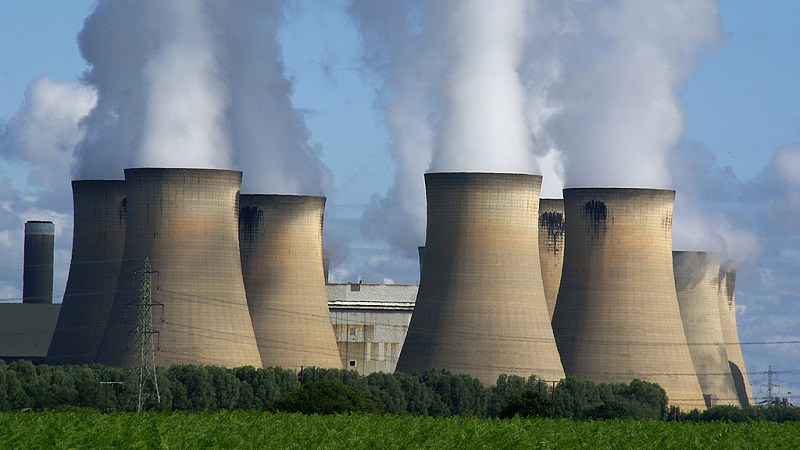A coalition of twelve civil society organisations from Africa, Europe, and Russia has issued a scathing report denouncing the growing push for nuclear power in Africa by governments and powerful interests, setting off a global alarm.
The report, “The Alarming Rise of False Climate Solutions in Africa — The Nuclear Energy Misadventure”, warns that the promotion of nuclear power in Africa as a climate solution is both dangerous and misleading, calling instead for a bold, unified shift toward clean, renewable energy.
Released ahead of the Bonn Climate Conference (SB62), set to begin on June 16 in Germany, the report focuses on nuclear energy plans or announcements made by African governments in Angola, Burkina Faso, Egypt, Ethiopia, Ghana, Kenya, Morocco, Namibia, Nigeria, Senegal, Tanzania, Rwanda, and Uganda. South Africa remains the only African country currently operating a nuclear power plant which was commissioned under the apartheid government in 1984.
The report describes the rising interest in nuclear power in Africa as a “misadventure” driven not by practical energy needs, but by global nuclear industry lobbying, foreign commercial interests, and geopolitical competition. The report warns that Africa risks becoming both a testing ground for unproven nuclear technology and a battleground for competing nuclear exporters from Russia, China, and the West.
Makoma Lekalakala, a South African climate activist and Goldman Environmental Prize laureate, said the idea of using nuclear power in Africa to achieve climate goals directly contradicts the concept of a just transition. “The demand for a post-carbon economy must be green, sustainable, and socially inclusive,” she said in the report’s foreword. “But the nuclear lobby undermines this, distracting from the urgent need for a 100% renewable energy transition.” She added that nuclear projects consume time and funding that should instead go to proven, fast-acting solutions like solar and wind.
From Nigeria, Philip Jakpor, Executive Director of Renevlyn Development Initiative, emphasized the security risks of nuclear plants in volatile regions. “We are already dealing with pipeline sabotage, oil theft, and vandalism in the Niger Delta,” he said. “Now imagine adding a nuclear facility to that mix. What happens when terrorists target it?” Jakpor argued that Nigeria lacks the institutional and security infrastructure to manage a nuclear power plant safely. “It would need the protection of a military base, possibly secured by a foreign country like Russia,” he warned.
Ghanaian human rights advocate Alberta Kpeleku, Executive Director of 360 Human Rights, described nuclear power as a threat to public health, environmental safety, and financial stability. “From environmental disasters to health risks and economic concerns, it’s time for Ghana to reject plans for nuclear power,” she said. “There are too many dangers—radioactive waste, nuclear proliferation, potential for terrorism.” Kpeleku added that the consequences of nuclear accidents extend beyond the present generation, creating a legacy of harm. “Our children and their children will pay the price for decisions made today,” she said. “We need to invest in solar, wind, hydro, and geothermal—these are technologies we can afford, and they don’t poison our future.”
Kenyan environmental leader Phyllis Omido, a Goldman Prize recipient and founder of the Centre for Justice, Governance and Environmental Action, joined the criticism. “As part of Kenya’s anti-nuclear movement, we stand in solidarity with groups across Africa,” she said. “Nuclear energy isn’t just expensive—it locks us into energy dependence. It’s energy slavery for generations to come.” Omido argued that African nations have the potential to lead the world in renewable innovation, but that future is at risk if resources are diverted to nuclear projects backed by external interests.
Ugandan activist Sam Mucunguzi, Executive Director of Uganda Environment Action Now, raised financial and logistical concerns about Uganda’s plan to use nuclear energy to achieve near-universal electricity access by 2030. “The government wants to generate nuclear power by 2031, but even under ideal conditions, nuclear plants take over a decade to build,” he said. “The cost of building just 1,000 megawatts would be a quarter of Uganda’s entire national budget.” He noted that Uganda already has excess power generation and that the real issue lies in distribution and access. “We are already burdened with debt,” he said. “Adding nuclear would mortgage the country to foreign lenders and increase inequality.”
Other contributors to the report emphasized the global dangers of nuclear power. Francesca de Gasparis, Executive Director of the Southern African Faith Communities’ Environment Institute, stated: “When we compare nuclear to other energy choices on cost, safety, construction time, and waste, it simply doesn’t add up. It’s not needed, and it’s not wanted.”
Russian activist Vladimir Slivyak, Co-Chair of Ecodefense and a laureate of the Alternative Nobel Prize, pointed to recent global events to illustrate the risks. “Nuclear plants are vulnerable not only to climate change—floods, droughts, and storms—but also to war,” he said. “Just look at the Zaporozhye plant in Ukraine, now sitting inside a warzone. Every nuclear plant also produces materials that can be used to make nuclear weapons or dirty bombs.”
The report’s authors argue that the focus on nuclear power in Africa will siphon already limited climate finance away from renewable energy and adaptation projects. With more than 75% of Africa’s climate finance needs unmet, and most funding arriving as debt, they say the nuclear path is not only dangerous but economically reckless.
They call for an immediate halt to all nuclear announcements and developments across the continent. Instead, they urge African governments, civil society, and international institutions to commit to clean, safe renewable energy. They propose annual investments of over $200 billion through the end of this decade to meet climate goals and the continent’s growing energy demands.
The report also urges the International Atomic Energy Agency (IAEA) to impose a moratorium on nuclear projects in Africa to allow for inclusive consultation and reassessment. It calls on the World Bank to exclude nuclear from its “Mission 300” initiative, which aims to connect 300 million Africans to electricity by 2030. According to the authors, nuclear power in Africa does not meet the bank’s environmental or social safeguards and is wholly unsuitable for urgent energy access needs.
Amid the global climate crisis “Africa does not need false solutions,” the report concluded. “We already have real ones—renewable, abundant, and ready to power the continent forward.”





